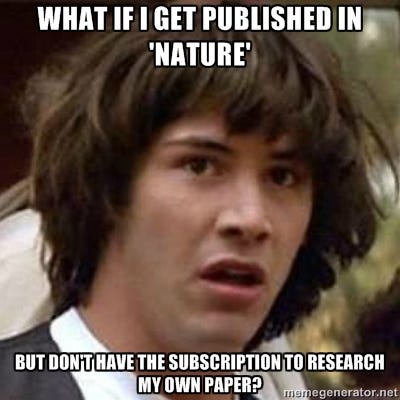The Academic Publishing System is a Failure
Not just ethically, but it actively works against the impact and dissemination of knowledge, too
You’re scrolling through twitter and happen upon a tweet describing interesting results from a new research study. You click the link. You hit a paywall. Now what?
If you’re savvy enough to know how to access pay-walled articles though backdoor means or are lucky enough to have access to a university library, your quest for knowledge may not be thwarted by the paywall. But for the general public – many of whom we are intending to inform with our research – accessing research articles can be a challenge. Even for academics, accessing articles can take many websites, logins, and work arounds to download a damn PDF.
Why is it so hard to access science? Because the modern academic publishing model is set up to be difficult and turn a (massive) profit for publishers. The goal is to make money, not disseminate knowledge.
In short how it works is that scientists author a manuscript and submit it to an academic journal. The journal then sends the manuscript out for peer-review to other scientists working in that research area for comments. The reviewers then submit their recommendation to the journal (they are not paid for this work). If the journal editors decide to pursue the article, the original authors make revisions and then the article may be accepted for publication. The journal staff then copy edit and format the article and it’s published online and perhaps in print. University libraries pay to subscribe to journals and journal publishers.
The only way to access the article, then, is to be at an academic institution with access to that journal or pay a per-article download fee.
What about “open access” articles? In nearly all cases, authors must pay thousands of dollars to publish their own work in an open access journal. To make research freely open in our current system is a pay-to-play game – a game most researchers can’t afford.
In short, the system is a failure.
Most discussion on the failures of the academic publishing system center on the fact that most university research is federally funded and that because tax dollars support the research, the public shouldn’t have to pay to read the results. Also, the issue with the pay-to-play open access approach is that it excludes researchers without large grants or an affluent institutional affiliation, and is highly prohibitive to researchers outside the US and Europe from participating. Who the hell wants to spend US$11,000 to publish an article in Nature?
But our academic publishing system is a failure beyond these financial pitfalls. The academic publishing system actively limits the impact and dissemination of knowledge, and new research is quantifying these impacts.
Earlier this week, PsyPost covered a new research article (which costs US$39.95 to read) showing what they dubbed the “SciHub” effect on paper citations. Using data from a dozen leading journals in economics, consumer research, neuroscience, and multidisciplinary journals, the authors showed that papers that were downloaded on SciHub – a hacker website run by Alexandra Elbakyan that bypasses paywalls and provides users access to tens-of-millions of articles in one click – were cited 1.72x more than papers not downloaded. And, the number of downloads is positively correlated with future citations of that paper.
These data suggest that availability and access of research is a positive driver of that research being cited – an indication of the paper’s impact. These results coincide with results on the impact of Twitter on journal article citations, too. A 2011 study found a positive correlation between tweets about a paper and citations in the medical field, and showed that highly tweeted articles were 11x more likely to be cited than less tweeted articles. A 2020 study also confirmed the positive correlation between tweets and citation counts across six fields of research.
Knowledge that cannot be accessed cannot be used. And if knowledge is not used, it is not having an impact on our world.
Prior to the internet age, journals were the best mode by which scientists had to communicate their results to others. Yet, our publishing model is a mid-century relic that is now actively working against the mission of science. The internet has radically changed how we disseminate and consume information, especially research. Open-access pre-prints (i.e., articles that are uploaded to an online repository pre-publication) have grown beyond physics to be normative in most academic fields; social media is the primary medium by which scientists promote their work; and, universities and scientists are growing tired of the pay-to-play publishing model.
There is, however, a growing consensus that open access of research is where we need to be, and there are some high-profile instances of organizations cutting ties with the old models in favor of impact. The European Research Council that funds a large proportion of basic research in Europe, for example, now requires scientists to publish funded results only in open access journals. And, The University of California system cut off their subscription to Elsevier back in 2019 over open access disputes (though they now have a new deal with the publisher).
Slowly the incentives are shifting in favor of open access, but such tides are slow to turn. Although there are many ethical arguments against the current publishing models, the bottom line is that the current standard of academic publishing works against science having an impact on our world by prohibiting access to research for those outside the academy, and by prohibiting researchers at small institutions and those outside the scientific West from paying-to-play for open access. Creative solutions are being thought up and it will be interesting to observe which model(s) wins out to make science more accessible and impactful for all.







Books and periodicals (even newspapers) are no longer easy to get or worth the money..Soooo in
really self-defeating way the prices go up to recover from lost readership and ultimately it's like the $10 cheeseburger.
The root problem is that someone has to pay for the people who shepherd the article from submission to publication. The old model was to have universities and individual subscribers pay; the new model is to have authors (i.e., grants) and universities pay; no one is happy with either. If we want the appearance of free publications freely available, we could have governments pay the costs, but that would create its own problems, as publishers jump in to publish nonsense to get the subsidies from the government. Or we could have governments take over publishing, as they have so many other formerly private activities. The only thing that's certain is that someone will have to pay.